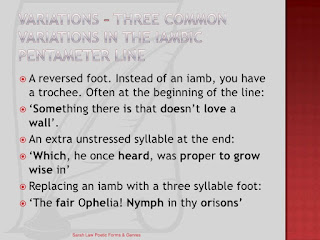The first known use of blank verse in the English language was by Henry Howard, Earl of Arundel and Surrey in his interpretation of the Æneid (c. 1554). He was possibly inspired by the Latin original, as classical Latin verse (as well as Greek verse) did not use rhyme; he may have been inspired by the Italian verse form of versi sciolti, which also contained no rhyme.Christopher Marlowe was the first English author to make full use of the potential of blank verse, and also established it as the dominant verse form for English drama in the age of Elizabeth I and James I. The major achievements in English blank verse were made by William Shakespeare, who wrote much of the content of his plays in unrhymed iambic pentameter, and Milton, whose Paradise Lost is written in blank verse. After Milton (in fact, during his later life), blank verse went out of fashion and for a century and a half the favored verse form in English was that of couplets. Romantic English poets such as William Wordsworth, Percy Bysshe Shelley, and John Keats revived blank verse as a major form
Pages
- Home
- Modern Drama
- Classical Drama
- Novel
- Prose
- Shakespeare's Drama
- History of English Literature
- Criticism
- American Literature
- Study Skills
- Classical Poetry
- Classical Poetry Short Ques
- Literary Forms And Movements
- History of Western Civilization
- Short Questions of English Literature
- Romantic Poetry
- Modern Poetry
- TEFL
Subscribe to:
Post Comments (Atom)
Stoicism
They showed indifference to all problems and challenges of life. The foundation of their philosophy was built on the belief that everythin...
-
LAW OF PROBABILITY AND NECESSITY: The law of probability in terms of tragedy simply means the probability that a given character will ...
-
Charles Lamb as an Essayist Charles Lamb a well known literary figure in the nineteenth century is chiefly remembered for his “Elia” e...

















No comments:
Post a Comment